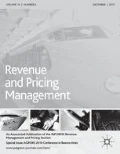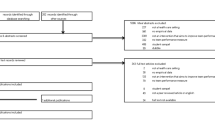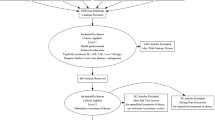Abstract
Developing well-rounded revenue management professionals is a key challenge for the hotel industry. Traditional approaches toward revenue management training have typically developed sound technical expertise without developing other important business skills. Simulations have been advocated as a solution to deliver holistic revenue management education. This paper aims to identify the learning outcomes achieved through a simulation-based revenue management training program. It reports the learning outcomes of students engaged in a hotel revenue management simulation. Thematic analysis reveals six sets of critical learning outcomes: revenue management strategy; hotel operational knowledge; decision-making ability; value of teamwork; communication skills; and personal readiness for the workforce.
Similar content being viewed by others
References
Beck, J., B. Knutson, C. Cha, and S. Kim. 2011. Developing Revenue Managers for the Lodging Industry. Journal of Human Resources in Hospitality and Tourism 10 (2): 182–194.
Benckendorff, P., G. Lohmann, M. Pratt, P. Reynolds, P. Strickland, and P. Whitelaw. 2015. Online Business Simulations: Good Practice Guide. Sydney: Australian Government Office for Learning and Teaching.
Curland, S.R., and S.L. Fawcett. 2001. Using Simulation and Gaming to Develop Financial Skills in Undergraduates. International Journal of Contemporary Hospitality Management 13 (3): 116–119.
Davies, C.J., and M. Shafer. 2013. Building the Perfect Analytics Analyst: What Will it Take to Success in the Future? Journal of Revenue and Pricing Management 12 (4): 378–381.
Demirciftci, T., G. Cetin, and A. Bilgihan. 2017. Coping with RM Challenges in Hospitality Education. Journal of Revenue and Pricing Management 16 (5): 499–512.
Edelheim, J., and D. Ueda. 2007. Effective Use of Simulations in Hospitality Management Education—a Case Study. Journal of Hospitality, Leisure, Sport and Tourism Education 6 (1): 18–28.
Feinstein, A.H., and S.J. Parks. 2002. The Use of Simulation in Hospitality as an Analytical Tool and Instructional System: A Review of the Literature. Journal of Hospitality and Tourism Research 26 (4): 396–421.
Ferguson, M., and S. Smith. 2014. The Changing Landscape of Hotel Revenue Management and the Role of the Hotel Revenue Manager. Journal of Revenue and Pricing Management 13 (3): 224–232.
Frederking, B. 2005. Simulations and Student Learning. Journal of Political Science Education 1: 385–393.
Gibbs, G. 2007. Analyzing Qualitative Data. Thousand Oaks: Sage.
Griffin, R. 1995. A Categorization Scheme for Critical Success Factors of Lodging Yield Management Systems. International Journal of Hospitality Management 14: 325–338.
Jilani, S.F., and M. Yasmin. 2016. Analyzing the Effectiveness of Simulation in Promoting Learning Automony: Perceptions of ESP Hotel Management Students. Psychology 7: 1154–1162.
Josephi, S.H.G., M.B. Stierand, and A.A. Mourik. 2016. Hotel Revenue Management: Then, now, and tomorrow. Journal of Revenue and Pricing Management 15 (3/4): 252–257.
Jung, T., E.M. Ineson, C. Hains, and M. Kim. 2013. Contributors to Hospitality Students’ Knowledge Enhancement. Journal of Hospitality, Leisure, Sport and Tourism Education 13: 97–106.
Kimes, S.E. 2008. Hotel Revenue Management: Today and Tomorrow. Cornell Hospitality Report 8: 4–14.
Kimes, S.E. 2011. The Future of Hotel Revenue Management. Journal of Revenue and Pricing Management 10 (1): 62–72.
Kimes, S.E. 2017. The Future of Hotel Revenue Management. Cornell Hospitality Report 17 (1): 3–10.
Kolb, D. 1984. Experiential Learning—Experience as the Source of Learning and Development. Upper Saddle River, NJ: FT Press.
Koupriouchina, L., J.P. van der Rest, and X.L. Wang. 2015. Revenue Management Education (RevME), 30 April-2 May 2015, University of Delaware, USA. Journal of Revenue and Pricing Management 14 (5): 384–388.
Krippendorff, K. 2004. Content Analysis: An Introduction to its Methodology. Thousand Oaks: Sage.
Martin, D., and B. McEvoy. 2003. Business Simulations: A Balanced Approach to Tourism Education. International Journal of Contemporary Hospitality Management 15 (6): 336–339.
Pratt, M., and S. Hahn. 2015. Effects of Simulation on Student Satisfaction with a Capstone Course. Journal of Hospitality and Tourism Education 27: 39–46.
Pratt, M., and S. Hahn. 2016. Enhancing Hospitality Student Learning Through the Use of a Business Simulation. Journal of Hospitality, Leisure, Sport and Tourism Education 19: 10–18.
QSR International. 2017. NVivo Qualitative Data Analysis Software; QSR International Pty Ltd. Version 11, 2017.
Red Global Group Pty Ltd. 2018. REVSIM. http://redglobalgroup.com/contact-red-global-hotel-simulations/. Accessed 6 March 2018.
Russell Partnership Technology. 2018. HOTS—The Hotel Simulation. http://www.thetotalsimulator.com/hots—hotel-simulation. Accessed 6 March 2018.
Skugge, G. 2004. Growing Effective Revenue Managers. Journal of Revenue and Pricing Management 3 (1): 49–61.
Wang, X.L., C.Y. Heo, Z. Schwartz, P. Leoherel, and F. Specklin. 2015. Revenue Management: Progress, Challenges and Research Prospects. Journal of Revenue and Pricing Management 32 (7): 797–811.
Author information
Authors and Affiliations
Corresponding author
Rights and permissions
About this article
Cite this article
Cox, C. A simulation approach to hotel revenue management training. J Revenue Pricing Manag 17, 356–364 (2018). https://doi.org/10.1057/s41272-018-00159-1
Received:
Accepted:
Published:
Issue Date:
DOI: https://doi.org/10.1057/s41272-018-00159-1




